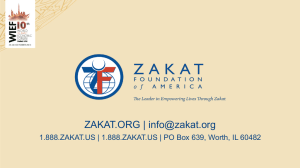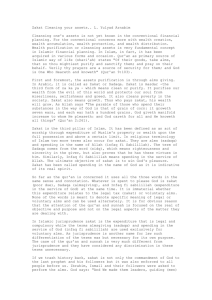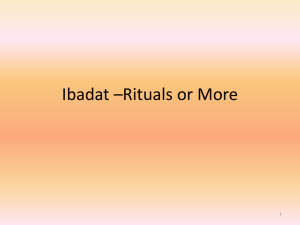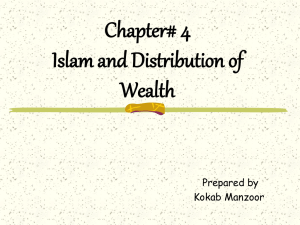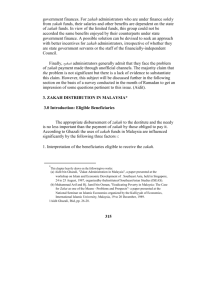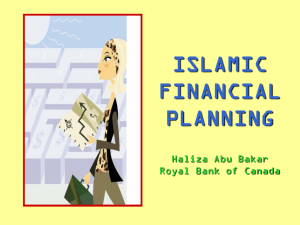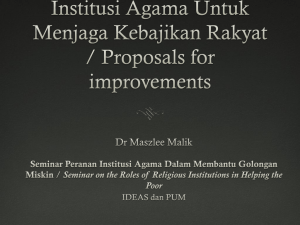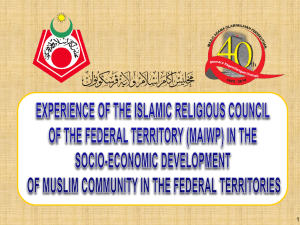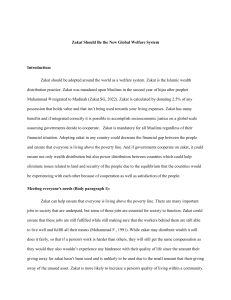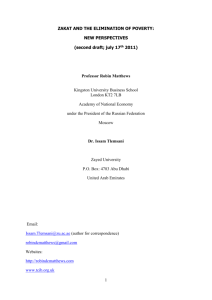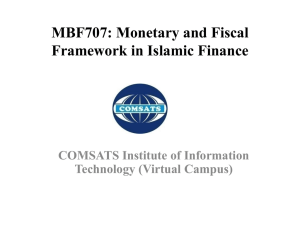File
advertisement
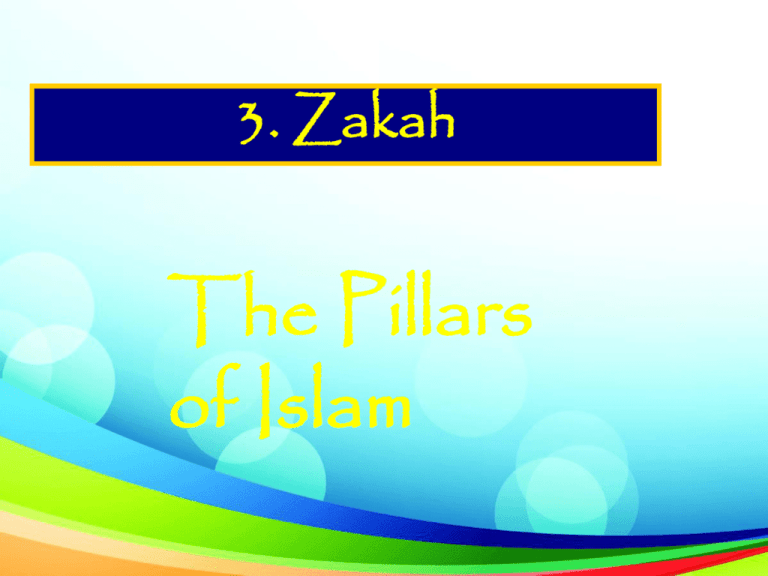
3. Zakah The Pillars of Islam Zakat is not the same as ordinary spontaneous charity such as we may donate to on the street. In Islam this form of charity is called “Sadaqah”. In Arabic, Zakah means “to purify”, and this tells us a lot about the symbolism behind this Pillar. But first we start with the Muslim view of the world. We believe that Allah SWT has created everything in the universe, and as such it belongs to Him, including the material possessions which we may think that we “own”. To us, all these are gifts from Allah SWT, and on temporary loan from Him. It is therefore unsurprising then that we consider the sharing of these gifts from Allah SWT to be a duty of our religion. In this way having wealth is not a problem for Muslims because it provides an extra opportunity to help a fellow Muslim. Zakah itself takes the form of: 2.5% of one’s total assets, and is paid voluntarily, usually on the day of Eid ul Fitr, and only if the family can afford to feed themselves first. Zakah is not intended to bankrupt families! In large Muslim countries Zakah is collected with the other taxes e.g. Pakistan, although it is NOT compulsory! In USA, it may be organised by the Mosque, or individual families can donate to Islamic charities e.g. The Red Crescent. Muslims do not consider the only beneficiaries of Zakah to be the poor, but it gives the wealthy in society the opportunity to share their blessing and so purify themselves in the eyes of Allah SWT. Look at western society and you will see the megarich donating vast sums to charity. Bill Gates has been largely responsible for paying drug companies to research Malaria cures. THE BENEFITS OF ZAKAT The moral and material benefits of zakat are obvious. Giving zakat purifies the heart of the giver from selfishness and greed for wealth and develops in him sympathy for the poor and needy. And receiving zakat purifies the heart of the recipients from envy and hatred of the rich and prosperous, and fosters in him a sense of good will towards his brother Muslims who although they are better off, have shared their wealth with him for the sake of God. RECIPIENTS OF ZAKAT Those who are eligible to receive zakat are mentioned in the Holy Qur'an. "The alms are only for the poor, the needy, those who collect them, those whose hearts are to be reconciled, to free the captives and the debtors, for the cause of God, and for the travellers; a duty imposed by God. God is All-Knowing, AIIWise." (9:6ql It should be remembered that these categories of persons who are to be helped by zakat were laid down fourteen hundred years ago. They are equally applicable to our own time. I. The poor: Those who does not have anything to support themselves . 2. The needy: Those people who have some income or earnings but it is not enough to provide them with basic needs. 3. Zakat collectors: The salaries of these workers may be paid from this fund. 4. Converts: Those people who have embraced Islam and . Attempts should be made to settle them in a normal life. 5. People who are not free: This category would include payment of ransom for freeing Muslim salves from slavery from their owners. 6. Debtors: People who are unable to pay debts incurred due to pressing lawful needs. 7. Wayfarers and travellers: Those people who are rendered helpless out side their city. 8. In the Cause of Allah Zakah becomes obligatory: 1) The property has reached the amount of a Nisaab which will be mentioned afterward. 2) The owner of that property is mature and sane. 3) He is able to dispense of that property. 4) In the case of cows, sheep, camels, gold, silver, it is necessary to possess it for twelve months, however, the obligatory precaution is that from the beginning of the twelfth month, the related Zakah is taken out. If during the twelfth month, some of the conditions disappear, the obligation of Zakah is not dropped. Qualification of Wealth 1.A particular Muslim should possess it. Possession means acquisition and right of disposition and usage. 2.Any wealth possessed by a person as qualified above must pay Zakat, even if the title of possession is illegal. Stolen wealth is not exempted from Zakat. 3.The person who borrows money or a commodity and who is entitled to dispose of what he has borrowed at his own discretion must pay Zakat on what he borrowed. However, if the borrowed wealth is to meet the genuine requirement of livelihood, the wealth becomes exempt. Any person, in the categories who deserve a share of Zakat, is exempt from paying Zakat to meet his livelihood needs. 4.The wealth that is used to meet a requirement of livelihood is not subject to Zakat. Thus the house you live in, the car used by you, the jewelry usually adorning the woman, the stored food provisions for the consumption of the individual or his family, all of this is exempted even its value may exceed the limit (Nisab). However, if a Muslim woman buys jewels with the intension to save her money or to invest in Gold or any other precious metal or stone of value, or keep the wealth from devaluation or otherwise, she must pay Zakat on such jewels even if she puts them on from time to time for adornment.
